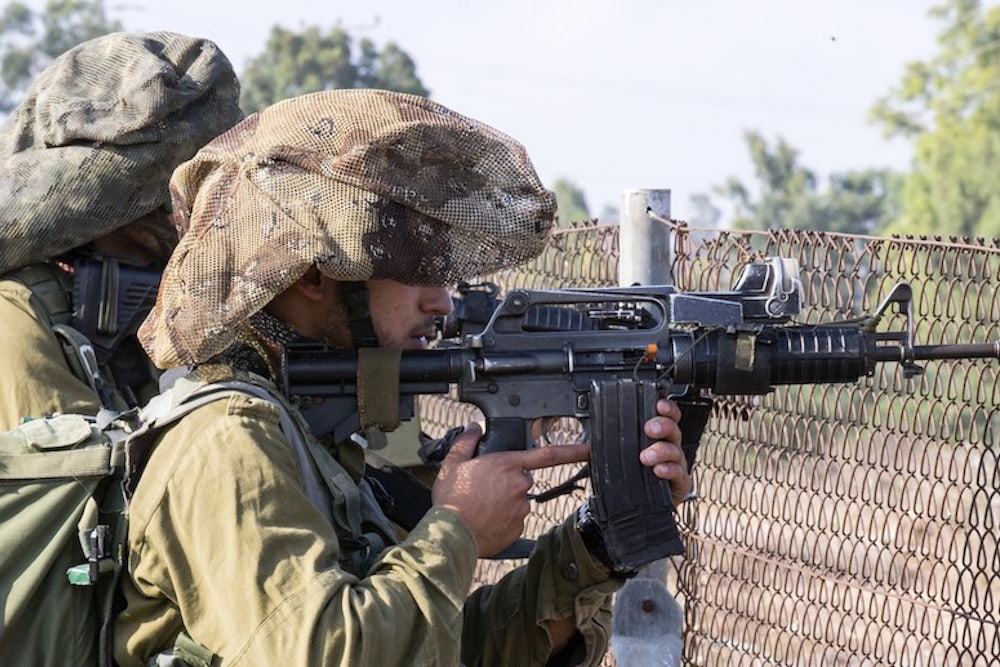Children are dying in Gaza. In the coming days, more will die. And though many die as shields cruelly used by cynical Hamas terrorists, they are being killed by bombs from Israeli planes and shells from Israeli tanks. And so even as we acknowledge that Hamas’ hands are stained with the blood of its own people, for Israel, too, there must be a moral accounting.
I do not mean simply a refrain we have heard frequently in recent weeks: “No country on earth would tolerate missiles raining down on its citizens.” This sentence is probably true. But it is also irrelevant. The question is not what some other country would do, but what Israel ought to do. And that question is not as easily answered. In fact, it presents us with one of the great moral paradoxes and tragedies of our time: A war which must be fought—and which seems impossible to fight morally.
Traditionally, moral thinking about war is divided into two broad questions. First, we ask whether the decision to go to war was a moral one. In doing so, we ask: Are the reasons for the war morally compelling? Were less-destructive alternatives considered and pursued?
For Israel, the first question seems easier to answer. Few would deny that, in principle, Israel’s war with Hamas is both just and necessary. Israel acts on the most clear justification possible: self-defense after days of restraint, warnings, and pleas—as rockets continued to land on its cities and later, as militants sprang from tunnels to kill its citizens. Ceasefires have been offered, but Hamas has rejected them. And whatever criticisms one may have of Israel’s failures to midwife an effective and peaceful alternative to Hamas (and I have many), these do not undermine the fundamental justice of this self-defense.
But there is also a second, larger question: How should wars be fought? And here, Israel runs into a problem. Because in the conduct of war, we insist not only that combatants be the sole targets of military action or that steps be taken to reduce civilian deaths. But we also insist on proportionality; that the military value of a target must outweigh the anticipated harm to civilians.
And on this key issue, Israel may seem to fail the test. True, Israel only targets combatants and takes unprecedented efforts at avoiding civilians (making personalized phone calls to civilians before striking areas near them), but can we confidently say that the anticipated harm to innocents is justified by Israel’s expected military gains? The degrading of Hamas’ rocket capabilities, and most of all the destruction of its terrifying network of offensive tunnels (fortified by the limited cement that Israel permitted into Gaza for humanitarian purposes) are valuable military goals. But as the Palestinian death count rises above 500—many of these civilian—I find myself bewildered: Are these tunnels really worth the lives of all those children?
And the truly horrifying thing is that it is pretty clear that Israel couldn’t do much better. With Hamas headquarters, weapons caches, and infiltration tunnels buried below hospitals, mosques and homes, there may simply be no way for Israel to actually pass the test of proportionality. The killing of any individual Hamas operative, the destruction of any particular piece of terrorist infrastructure, can seem pale and insignificant beside the quantity of innocent death.
We are thus left with a paradox: Morality demands that Israel fight this war, but allows no way to fight it morally. In this conflict, reason itself seems to fail.
There is, however, a way out of this paradox. And we find it at the moment we realize that Hamas’ actions have made this war about more than Israel or Palestine; it's a war about future of morality in armed conflicts. For if Israel declines to fight, we live in a world where terror groups use their own civilians, and twist morality itself, to bind the hands of those who try to fight morally. In this world, cruelty is an advantage, and the moral are powerless in the face of aggression and indiscriminate attack. And make no mistake: The eyes of the world are on Hamas, and terrorist groups worldwide will—as they have for generations—learn from the tactics of Gazan terrorists and the world’s reaction. So if Israel allows Hamas’ human shields to defeat it now, we will all reap the results in the years to come.
But there is an alternative. We can say that there is a principle worth fighting and dying for: Civilians cannot be used to make just wars impossible and morality will not be used as a tool to disarm. And once we have that principle, the proportionality calculation changes. The deaths of innocents are not simply outweighed by Israelis’ right to live without daily rockets and terrorists tunneling into a kibbutz playground; but by the defense of a world in which terrorists cannot use morality to achieve victory over those who try to fight morally. It is the protection of that world, one in which moral soldiers still have a fighting chance, that justifies Israel’s operations against Hamas today. And it is that greater cause that decisively outweighs the terrible toll in innocent life.
